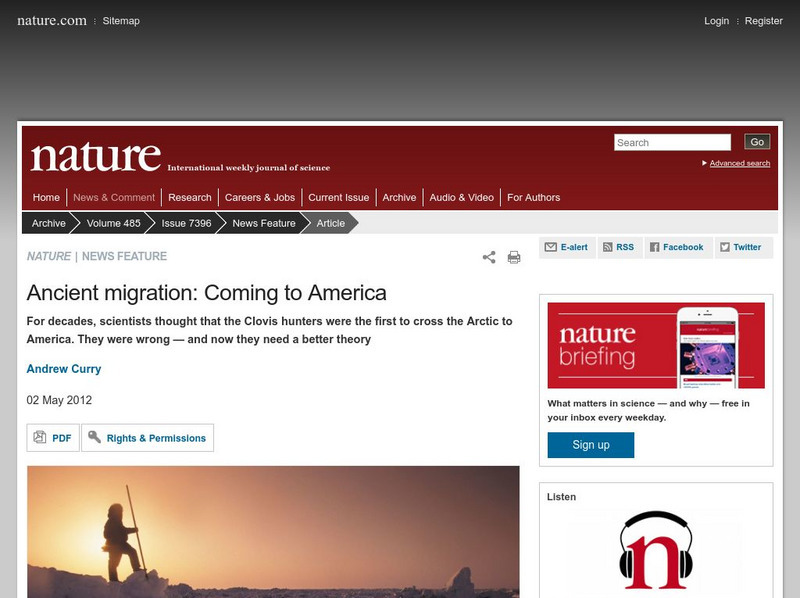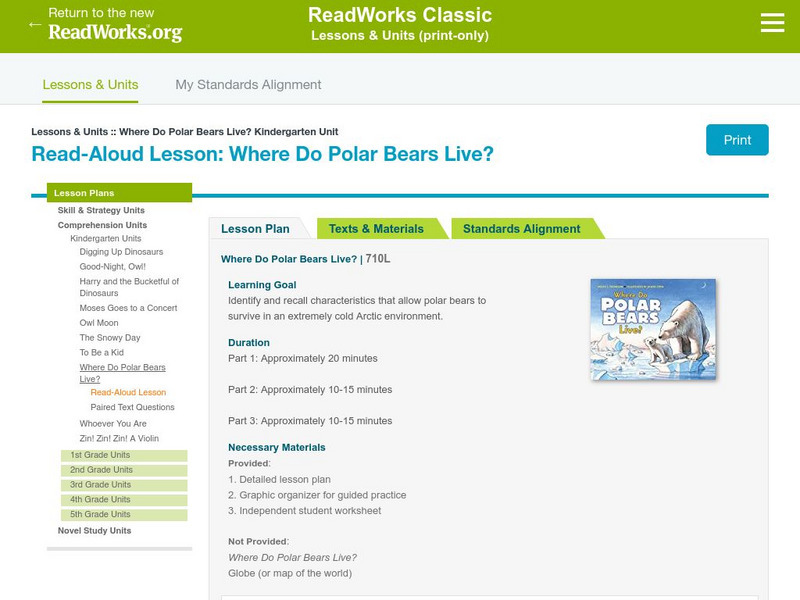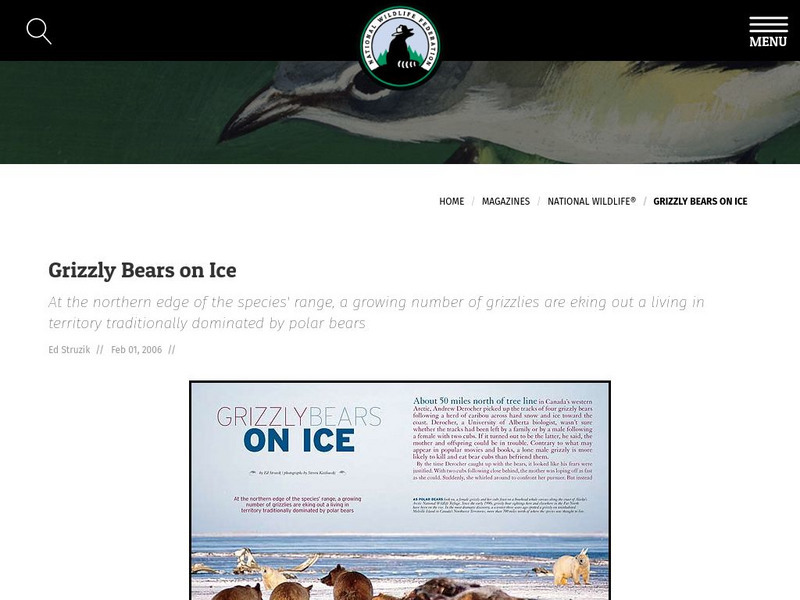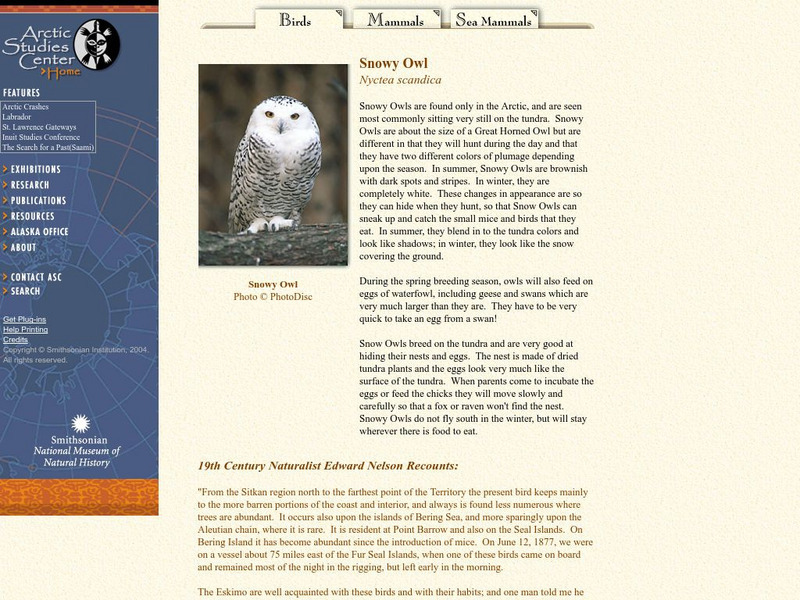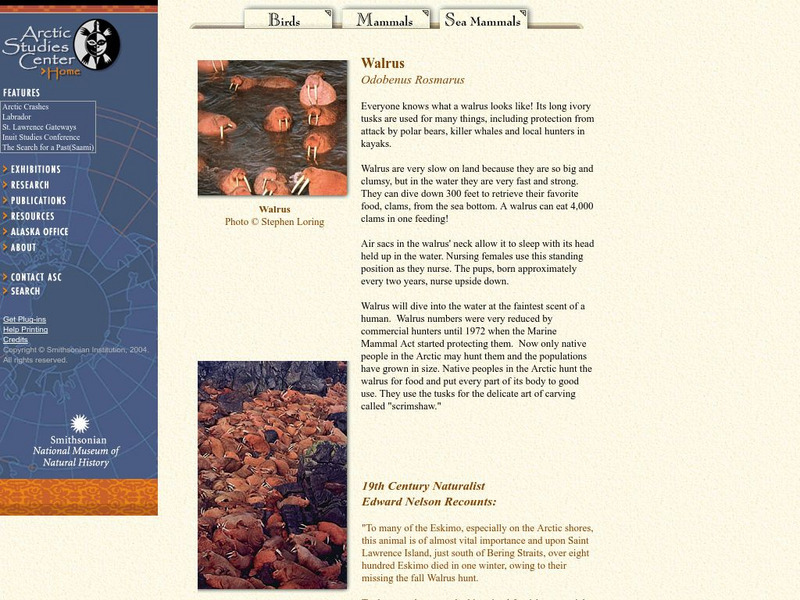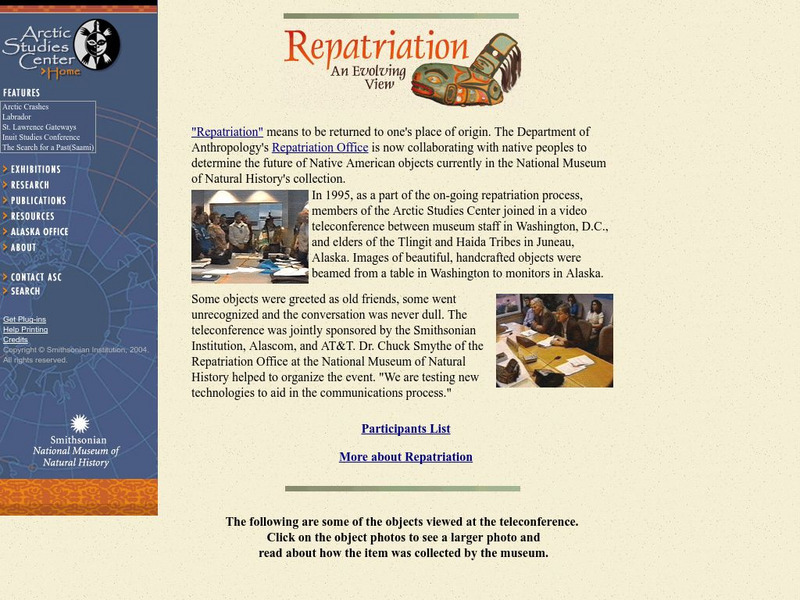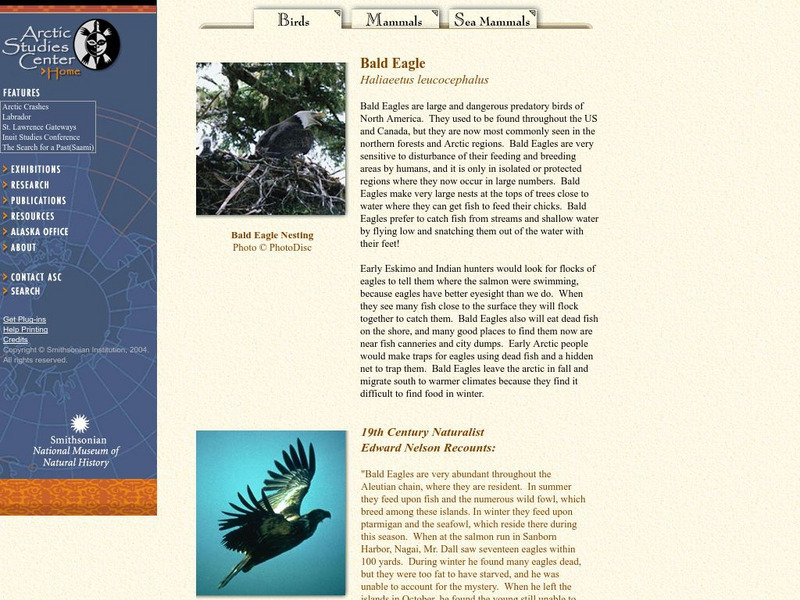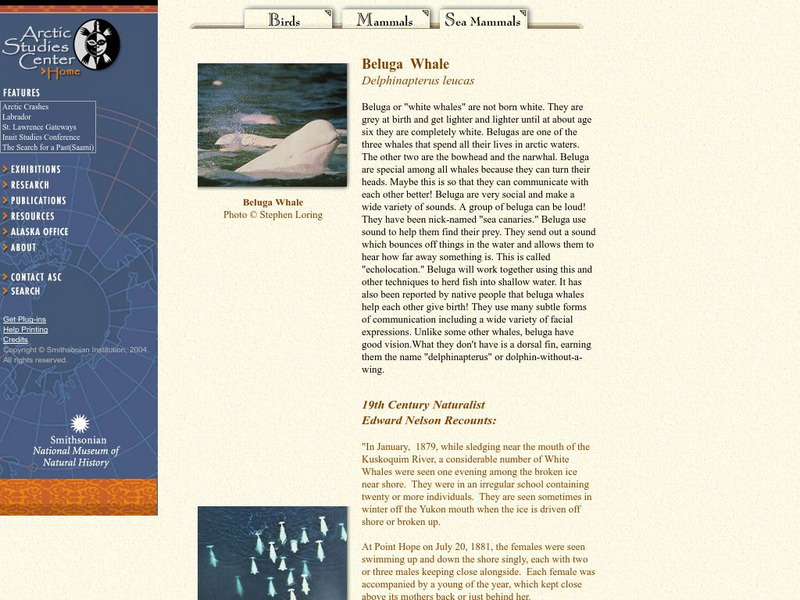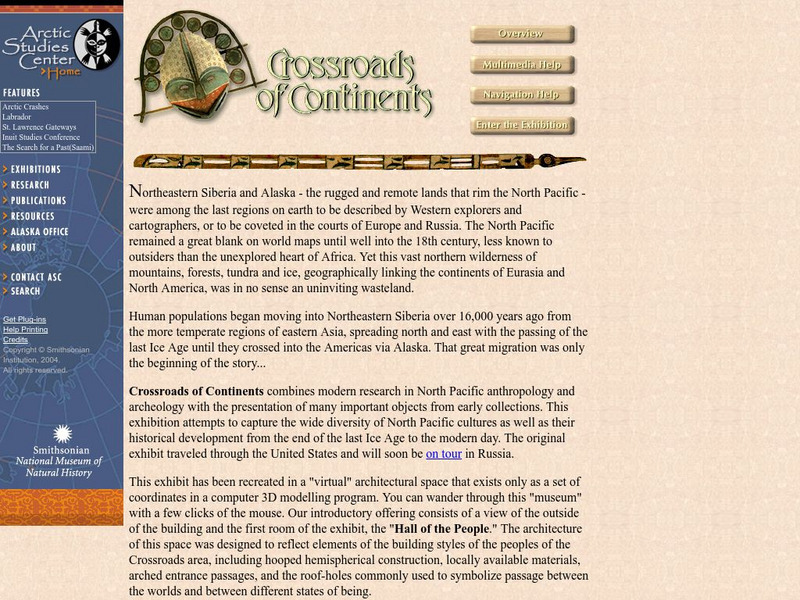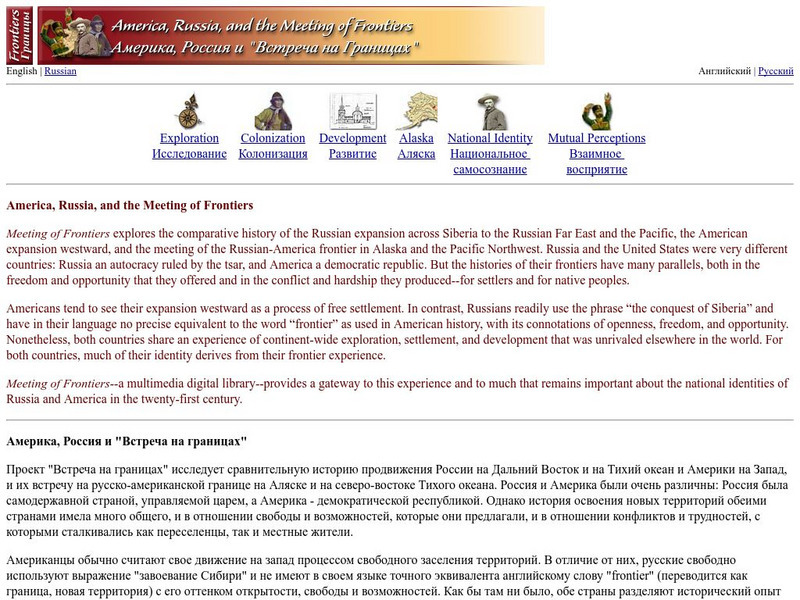Nature Research
Nature News and Comment: Ancient Migration: Coming to America
A May, 2012 news feature from Nature magazine looks again at early migration theories that brought man across the Arctic to America. Was Clovis man really the earliest?
Read Works
Read Works: Read Aloud Lesson: Where Do Polar Bears Live?
This lesson is a close reading of "Where Do Polar Bears Live?". After reading the book to the class, students will be able to identify and recall characteristics that allow polar bears to survive in an extremely cold Arctic environment....
PBS
Pbs Learning Media: Tracking Polar Bears
In this interactive activity adapted from the USGS Alaska Science Center, students will track the movements of a polar bear as it migrates across the changing Arctic sea ice and compare the paths of four different polar bears.
Curated OER
Bureau of Land Management: Bureau of Land Management
The BLM manages one in every 10 acres of land in the United States, and approximately 30 percent of the Nation's minerals. These lands and minerals are found in every state in the country and encompass forests, mountains, rangelands,...
National Wildlife Federation
National Wildlife Magazine: Grizzly Bears on Ice
Grizzly bears are moving north and living in areas traditionally inhabited by polar bears. Their survival in this environment is shaky at best as politicians consider opportunities for oil exploration and the building of pipelines in the...
Smithsonian Institution
National Museum of Natural History: Snowy Owl
This Smithsonian website has a brief, but thorough, article on the Snowy Owl that also includes a picture and an extensive quote from the 19th Century naturalist Edward Nelson.
Smithsonian Institution
National Museum of Natural History: Walrus
This Smithsonian website has a brief, but thorough, article on the Walrus that also includes pictures and an extensive quote from naturalist Edward Nelson.
Smithsonian Institution
National Museum of Natural History: Repatriation
"Repatriation", returning to one's origin, is a program running through the Smithsonian examining Native American artifacts.
Smithsonian Institution
National Museum of Natural History: Bald Eagle
This Smithsonian website has a brief but thorough article on the Bald Eagles. Content also includes pictures and an extensive quote from naturalist Edward Nelson as he discusses the role of eagles in Eskimo myth.
Smithsonian Institution
National Museum of Natural History: Beluga Whale
This site provides a general overview of the Beluga Whale, complete with the personal observations of 19th Century Naturalist, Edward Nelson.
Smithsonian Institution
National Museum of Natural History: The Living Yamal
A Smithsonian site that tells of the history and culture of the Yamal people of Siberia.
Smithsonian Institution
National Museum of Natural History: Crossroads of Continents
Very interesting Smithsonian web exhibition on the culture of the peoples surrounding the Bering Strait. Enter the museum to find lost cultures due to the Cold War. Fun museum to click around in!
BBC
Bbc: New World Link to Arctic Find
Could the findings at Yana in northern Siberia point to an earlier crossing into the New World? Scientists are studying the evidence that point to sophisticated human hunters throughout the area at an earlier era than previously thought.
Curated OER
Cornell Lab of Ornithology : Common Loon
An abundance of facts, pictures, and sounds of the Arctic Tern can be found on this informative site. Listen to the sounds of this bird species on this site as well.
Curated OER
Cornell Lab of Ornithology : Common Loon
An abundance of facts, pictures, and sounds of the Arctic Tern can be found on this informative site. Listen to the sounds of this bird species on this site as well.
Curated OER
Cornell Lab of Ornithology : Common Loon
An abundance of facts, pictures, and sounds of the Arctic Tern can be found on this informative site. Listen to the sounds of this bird species on this site as well.
Other
Social History of the North: Circumpolar History Timetables
Find information on 37,000 years of civilization in the far North, including Russia, Northern Europe, and North America. This site is well organized, frequently updated, and offers an extensive bibliography.
Woods Hole Oceanographic Institution
Polar Discovery: Compare the Poles
A detailed comparison of many aspects of the two polar regions. Includes physical features, seasons, weather, types of ice, plants and animals, human population, and climate change.
NWT Literacy Council
Nwt Literacy Council: How to Kit: Culture and Traditions [Pdf]
This kit explains the importance of northern First Nations families keeping their languages and cultures alive through family literacy activities. It provides ideas and materials for cultural games (e.g., string games) and activities...
US Navy
The Navy Travels to the Poles
Learn about the exploration of the polar regions by the U.S. Navy. Links to various activities are found on the site.
Library of Congress
Loc: America, Russia & Frontier Meeting
This Web site is a multimedia English-Russian digital resource that describes the American westward-Russian eastward explorations and their frontier meeting.
Virtual Museum of Canada
Virtual Museum of Canada: Community Stories: Tuhaalruuqtut Ancestral Sounds
With the use of Inuit Art, photograph, and audio accounts (in the languages of the Inuit Peoples), the suffering, culture, and perseverance of Aboriginal settlements in the Canadian North is explored in an in-depth manner.
Other popular searches
- Arctic Animals
- Arctic Food Chain
- Arctic Ocean
- Arctic Ocean Diorama
- Preschool Arctic Animals
- Arctic Plants and Animals
- Arctic Region
- Arctic Circle
- Arctic Hare
- Arctic Peoples
- Arctic Predators
- Global Climate Change Arctic


